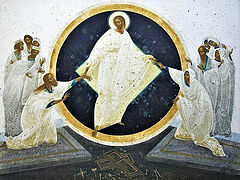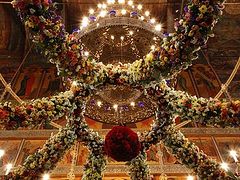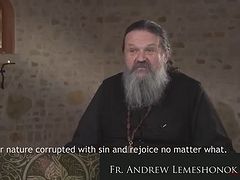Wondrous, bright, and triumphant Pascha. For thirty years, from the time when my life had radically changed, when it was infused with faith, I always spent this extraordinary day, or rather, night, at church. There was definitely a festive procession, always followed by Divine Liturgy and then, recieving Holy Communion. Kuliches, candles, colored eggs… The weather or the churches I attended could be different; my state of health or physical wellbeing could vary… But, arguably, what remained was the perception and deep understanding of this meaningful and singular church service, its all-encompassing joy and exuberance that we are having another universal feast, another spring, and festive embraces—because Christ Is Risen! The smiles, the laughter, and the endless throngs of people—those you know well, the “regulars,” and the so-called “guests” who come to church exclusively for the feasts of Pascha and Nativity. But it doesn’t matter; their elated and happy faces, the cheerful peal of bells, and the shoreless sea of people broken by the majestic waves of lit candles, whose fluttering lights were measuredly quivering in unison at every jubilant exultation: “Truly, He Is Risen!”
But there were two Paschal celebrations that particularly remain in my memory, because of the special feelings this feast had bestowed upon my heart and soul. I also remember them because seemingly mundane things, actions, and events can all of a sudden result in a genuinely spiritual revelation…
“I used three measures of flour”
Instead of in church, I celebrated my very first Pascha… in the kitchen
Instead of in church, I celebrated my very first Pascha… in the kitchen. My soul was already aglow with faith, but not powerfully enough for me to dare and step inside a church, and much less so for a nighttime service… I wasn’t quite ready for such a step. Following many years of persecution, a few churches had been reopened in Minsk, while my loved ones, including family and friends, weren’t believers, and they knew nothing about church life. Besides, I was a busy mom to a little girl.
But! I really wanted to celebrate Pascha! And I mean, to have THE FEAST. So that this day could become a very special, out-of-the-ordinary event, or overall, something truly big and bold. But, how? The only option I had was to cook the festive foods for my family and myself: to color the eggs and bake the kulich. Well, if the colored eggs sounded like a pretty straightforward thing to do—our grandmothers always made them in the run-up to the feast—baking the kulich was a completely different story. No one had taught me the tricks of dealing with leavened bread. Internet, with its omnipresence and trillions of cooking tips, wasn’t there as yet, but what I did have was a huge burning desire to try my hand at it. And to do it by all means! A “cross-your-fingers” or “try-your-luck” thing, but more like, holding out hope for God’s help, even if for such an ordinary and seemingly un-spiritual matter.
Surrounded by cookbooks and Grandma’s notes on age-old recipes, I began my search for the cooking tips on to successfully bake this miracle of the culinary trade called kulich. It turned out that there was a myriad of various of nuances and hidden secrets in this process—beginningwith the fact that I had to properly get all my ingredients ready for baking, correctly prepare the leaven and then the dough. I also had to know exactly when it was perfectly ready for baking; how to prepare the dough and the baking pans in a very particular manner, then remove it from the oven right on time, and so on and so forth.
After saying a prayer, I began the baking process. It truly resembles some kind of mystery when you combine the yeast and everything else that goes in there. Then, using your hands, and not that soulless kitchen gadget, you mix everything and sense how those completely different and distinct substances suddenly yield softly and pleasantly to become one whole which, as if alive, breathes while you knead it and press it with your hands.
Another parable He spoke to them: “The kingdom of heaven is like leaven, which a woman took and hid in three measures of meal till it was all leavened (Matthew 13:33).
On that particular Great Saturday, inside that ordinary kitchen, my heart was simply bursting with joy as my first-ever Paschal bread was baking inside the oven
I will never forget the feeling of blissful joy and quiet happiness that descended upon me once I took to making the dough… Afterwards, when I, like any other seasoned churchgoer, attended the Paschal Matins service and the festive procession and received Communion at night, it would be far from every time that I could experience anything like it. But, on that particular Great Saturday, inside that ordinary kitchen, my heart was simply bursting with joy as my first-ever Paschal bread was baking inside the oven.
How often I would later read about bread, those wise and vivid sayings, replete with symbolism and metaphor—be it in the Bible, or the holy fathers, or modern theologians! Christ would frequently tell parables about bread to the people! Perhaps it is because our daily bread is the essence of our life. We need it to survive here, in our earthly, material world. It also serves as a reminder about another kind of life—in heaven, bestowed upon us by the Lord Who said of Himself: I am the bread of life (John 6:48).
Or, there is another symbolic representation: Just as the fire inside the oven acts upon the dough, so do man’s earthly travails prepare the soul for eternity. Holy Hierarch Theophan the Recluse developed this thought even further:
“When the lady of the house puts a pie in the oven, she doesn’t remove it until it’s cooked. The Lord of the universe has put you in the oven and will leave you there until you’re done. So be patient and wait. You won’t be in the oven a minute longer than necessary. As soon as you’re ready, the Lord will take you out. But if you jump out by yourself, you’ll be like a half-baked pie.”
But the main thing is that, in the guise of bread, the Savior allows us to draw near or even become one with Him in the sacrament of sacraments—Holy Communion, the heavenly food for the soul.
Sure, the Paschal dishes are ordinary and worldly food, albeit made for the festive table. We can treat them simply like any other food. But, on the other hand… Even though my first kulich turned out wonderfully fragrant, light, and simply delectable, it wasn’t what impressed me the most. It was that the Lord visited us, even if through such a mundane and earthly affair as baking.
Basically, the Spirit breathes where he will, whereas our wishes and actions are akin to the leavening, or the yeast, for the “dough” of life and that could be either well-made or messed up at times. It depends how, what, and to what end we are to prepare this “dough.” As for the Lord, according to the saints, He examines our hearts seeking sincerity, above all, and whether our heart burn within us, so that He, with His boundless generosity, both accepteth the deeds, and welcometh the intention, and honoureth the acts and praises the offering.1
Following the women the myrrh-bearers
Pascha of 2020 became the most memorable!
Pascha of 2020 became the most memorable one! The world succumbed to the epidemic of an unknown virus. Infection was everywhere, invisible and pervasive. Countries announced statewide lockdowns, stopped air and railroad travel, and canceled public events and celebrations. Public transport, streets, stores—everything was deserted. The churches stood empty, too. The faces were hidden—covered with medical masks; only the eyes were seen above them. Anxiety, fear, and desolation filled the air. No one knew what to expect next or what could happen in the future…
But how could we survive Pascha without its nighttime service? Without the festive procession? Or, Communion at night? Here, in Belarus, we had neither the universal lockdown nor the church service cancellations. That’s why my family and I decided to visit a small church of the Resurrection of Christ in Minsk. It wasn’t too far from home, away from the downtown; thus fewer people in attendance. Besides, it boasted of a spacious courtyard where everyone could comfortably keep a safe distance and adhere to all sorts of other precautions.
It was almost a midnight. For the first time, we hear the quiet singing of “Thy Resurrection, O Christ our Savior, the angels in the heaven sing…” The crowd of worshippers is so small that all of them can safely fit inside the church. Everyone is masked. It’s impossible to see the expressions on anyone’s face…
The procession with the cross goes outside. The cool breeze wafts through the air. Silence surrounds us, so unreal on the night of Pascha. The sound of ringing bells bounces off the neighboring high-rise apartment buildings, from its dark and seemingly “impassionate” windows, and returns back to us, the braves ones, who ventured tonight to arrive at the tomb of the Savior and light the path with the flickering light of our candles… “Thy Resurrection O Christ our Savior…”
Can it be that they, hidden behind those dark windows, are sleeping? What if they lie there, bound by sickness? Or, maybe they are staring at us? Well, we aren’t really righteous or heroes or, much less, lunatics devoid of any sense or sound reasoning. Nothing of this kind! We are those who wanted to get a breath of the Paschal joy and to experience the fullness of the Feast of feasts and the Triumph of triumphs. But where else can you get the fullness of it and feel awe-struck? At church and its service, and at Communion.
Why did that Pascha stand out so much? Because it was then when we felt like the women the myrrh-bearers, almost like them, yet unlike them… However, it was as if we had joined them in their walk towards the tomb of their Teacher. And neither the passing of centuries or millennia separate us…
As we walked in the nighttime procession of the twenty-first century, surrounded by uneasy silence and physical fear, facing the unknown and deadly danger, we were able to understand for the first time in our lives what those women should have felt at the time. They were walking surrounded by a world that still knew nothing about Him, Jesus of Nazareth; by a world that could care less about what happened to this Man…
As they walked there, the myrrh-bearers didn’t know yet that Christ rose from the dead. We knew. In this respect, we were worlds apart!
But where is the sea of the celebratory crowds? Where is the universal triumph? There are only a few of us today, just like back then—a timid trickle. They were worried and they feared—we were, too. They risked—and so did we. They were filled with sorrow—and the heart became the battleground of anxiety and fear, as the joy of the feast was struggling to recapture it. We almost felt desolate, as we trailed behind the priests who led us in the procession on this short-lived, but a truly symbolic journey, a journey back through the ages…
But still, our path was so much easier and merrier than theirs! The myrrh-bearers didn’t know yet that Christ rose from the dead as they walked. We knew. In this respect, we were worlds apart!
That’s why even if we couldn’t dare share warm embraces as we exclaimed, “Christ Is Risen!,” the paschal joy still trickled in—with the singing of the choir, our prayers, the pastoral homily of a priest who greeted the brave hearts who came to church for this service and genuinely confessed to us that he longed with all his heart to celebrate this service against all odds.
A Gospel message came to mind: Fear not, little flock, for it is your Father’s good pleasure to give you the kingdom (Luke 12:32). Do not be afraid; only believe (Mark 5:36).





